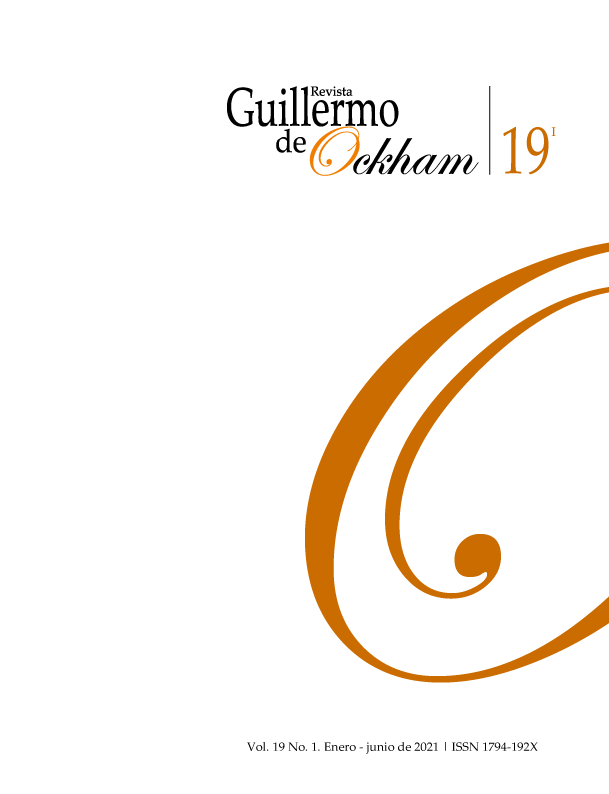The Revista Guillermo de Ockham provides an immediate and open access to its content, based on the principle of offering the public a free access to investigations to provide a global interchange of knowledge.
Unless otherwise established, the contents of this journal has a license with Creative Commons Attribution-NonCommercial-NoDerivatives 4.0 International (CC BY-NC-ND 4.0) http://creativecommons.org/licenses/by-nc-nd/4.0/
- Attribution: You must give appropriate credit, provide a link to the license, and indicate if changes were made. You may do so in any reasonable manner, but not in any way that suggests the licensor endorses you or your use.
- NonCommercial: You may not use the material for commercial purposes.
- NoDerivatives: If you remix, transform, or build upon the material, you may not distribute the modified material.
- No additional restrictions: You may not apply legal terms or technological measures that legally restrict others from doing anything the license permits.
Abstract
Industrialization and globalization processes across the american continent, have led to cultural homogenization and hybridization, as traditional expressions are affected by global influences and tendencies. These globalizing effects tend to uniform and menace local identities and folklore, putting them on risk of disappearance. Facing these tendencies, traditional marketplaces have become a cultural reserve and resistance space against modernization and homogenization, as a collaborative and participatory effort by manufacturers, merchants, consumers and visitors, who collectively struggle to preserve their cultural expressions, including handcraft, alimentary heritage, religious and superstitious beliefs, medicine and other traditional practices. This paper is envisioned to recognize the value and importance of popular markets or marketplaces in the american context, as a preservation space for a series of traditional practices, customs and beliefs, evidencing assorted sociocultural phenomena, through a wide range of products, artifacts and paraphernalia. Based on direct experience, photographic record, and assorted theoretical perspectives, it is possible to develop a series of taxonomic approaches, regarding the products and practices available in these markets, facilitating the identification of diverse multicultural processes and phenomena. As a result, this research has allowed to identify particular and unifier aspects across a sample of markets in Colombia, with supplementary explorations in the USA, Panama and Ecuador. These continental referents help recognize a series of geographic, economic and sociocultural factors that get materialized through a wide offer of products and artifacts.
Keywords:
References
Agencia Andes (2017). Las huecas de Ecuador se disputan los paladares del turismo culinario, El Tiempo, Diario de Cuenca. Retrieved August 26, 2019 from https://www.eltiempo.com.ec/noticias/novedades/1/las-huecas-de-ecuador-se-disputan-los-paladares-del-turismo-culinario
Agrovisión Colombia (2001). Agrovisión Colombia 2025. Bogotá: Ministerio de Agricultura de Colombia.
Ángel Bravo, R. (2012). Siga Bien Pueda - Special Events, International Image Festival 2012. Retrieved August 21, 2019 from http://www.festivaldelaimagen.com/es/invitados-2012/872-rafael-angel-bravo
Rafael Ángel Bravo. (2016). Galerías y plazas de mercado como espacio de conservación cultural y producción audiovisual. Nexus, (20), 246-267.
Ángel Bravo, R. (2018). La Galería o Plaza De Mercado como Expresión de Diversidad y Espacio de Conservación Cultural en el Continente Americano. Seminario Internacional de Investigación en Diseño, (10), 75-85. https://www.taller11gid.com/memorias-sid
Martín-Barbero, J. (1981). Prácticas de comunicación en la cultura popular: mercados, plazas, cementerios y espacios de ocio. Comunicación alternativa y cambio social, 32-53.
Castiblanco Roldán, A. (2011). Las plazas de mercado como lugares de memoria en la ciudad: anclajes, pervivencias y luchas. Ciudad paz-ando. 4(2), 123-132.
Castillo, H. H. (2014). Plazas de mercado en Bogotá, generadoras de residuos y desarrollo. Bogotá: CONAMA.
Coronado, M.C. (2010). Plazas de Mercado: Una Tradición Continua. Apuntes de Arquitectura. Retrieved August 21, 2019 from http://apuntesdearquitecturadigital.blogspot.com/2010/12/plazas-de-mercado-una-tradicion.html
Cruger. R. (2012). The Eames' Appreciation of the World Through Common Objects. Retrieved August 12, 2019 from https://www.treehugger.com/culture/eames-appreciation-world-through-common-objects.html
Eames, C. (2007). 100 Quotes by Charles Eames. Los Angeles: Eames Office.
Eames, C. (2015). An Eames Anthology. New Haven: Yale University Press.
Flores, G. (2014). La fiesta culinaria está en el Mercado Central, Mortero de Piedra. Retrieved August 21, 2019 from http://morterodepiedra.com/la-fiesta-culinaria-esta-en-el-mercado-central/
Eames, C. & Eames, R. (1957). Day of the Dead (Short film). Retrieved September 23, 2019 from https://www.youtube.com/watch?v=YJZf-2fLpGM&t=185s
Eames, C. & Eames, R. (1969). Tops (Short film). Retrieved September 23, 2019, from https://www.youtube.com/watch?v=UJ-VFMymEiE&t=219s
Eames, C. & Eames, R. (1972). Banana Leaf (Unreleased short film). Retrieved March 8, 2020 from https://www.imdb.com/title/tt0286481/
Fourdinier, G. (2017). Recreating the link between producers and consumers. Retrieved on March 15, 2020 from https://medium.com/welcome-to-agricool/recreating-the-link-between-producers-and-consumers-7c97fdadb282
García Canclini, N. (2001). Culturas híbridas: estrategias para entrar y salir de la modernidad. Barcelona: Paidós.
García Canclini. N. (2002). Entrevista con Néstor García Canclini. Retrieved August 22, 2019 from http://www.comminit.com/la/node/67260
García Canclini, N. (2003). Entrevista con Néstor García Canclini II. Retrieved August 22, 2019 from http://www.comminit.com/node/67264
García Canclini, N. (2005). Hybrid Cultures; Strategies for Entering and Leaving Modernity. Minneapolis: University of Minnesota Press.
Koenig, G. (2015). Charles & Ray Eames. Köln: Taschen.
La Hueca (2015). Especial: El Mercado Central de Quito. El Blog de La Hueca. Retrieved August 22, 2019 from https://elblogdelahueca.wordpress.com/2015/03/03/especial-mercado-central-de-quito/
Landeta D. (2014). Recorriendo los mercados de Quito, Diario El Comercio. Retrieved August 22, 2019 from https://www.elcomercio.com/tendencias/recorriendo-mercados-quito.html
Latacunga’s Decentralized Autonomous Municipal Government, GAD (2013). Ordenanza que reglamenta la ocupación del Mercado Cerrado de Latacunga. Retrieved August 21, 2019 from http://www.latacunga.gob.ec/ordenanzas/1339-1-106-ordenanza-reglamenta-la-ocupacion-del-mercado-cerrado-latacunga
Marzal Felici. J. (2004). Propuesta de modelo de análisis de la imagen fotográfica. Barcelona: Uji. Retrieved August 22, 2019 from http://www.analisisfotografia.uji.es/root/analisis/metod/metod.htm
Ministerio de Turismo de Ecuador (n.d). La gastronomía ecuatoriana al alcance de todos. Retrieved August 22, 2019 from https://www.turismo.gob.ec/la-gastronomia-ecuatoriana-al-alcance-de-todos/
Ocampo López, J. (1981). El folclor y los bailes típicos colombianos. Manizales: Biblioteca de escritores caldenses.
Pulos. A.J. (1983). American Design Ethic. Cambridge: MIT Press.
Restrepo, J.W. (2012). Plazas de mercado en Medellín como Centros de Distribución. Revista Universidad Eafit. 57-70.
Villegas, L. (1988). Arte Factos: Elementos de la vida cotidiana del Viejo Caldas. Bogotá: Villegas.

































